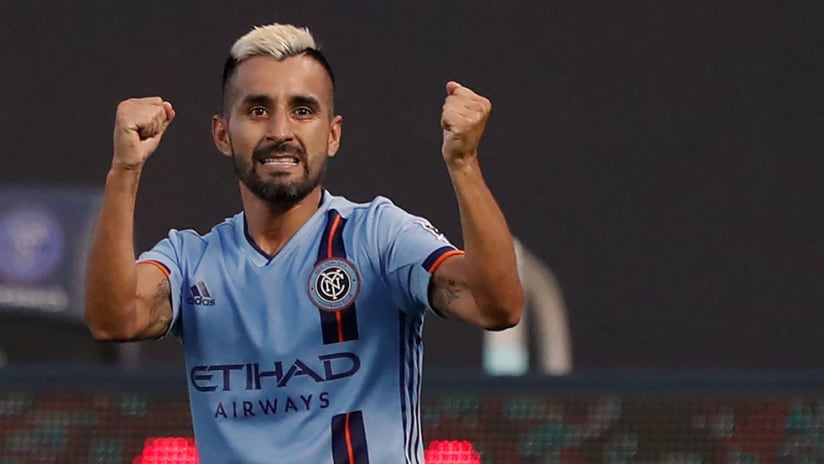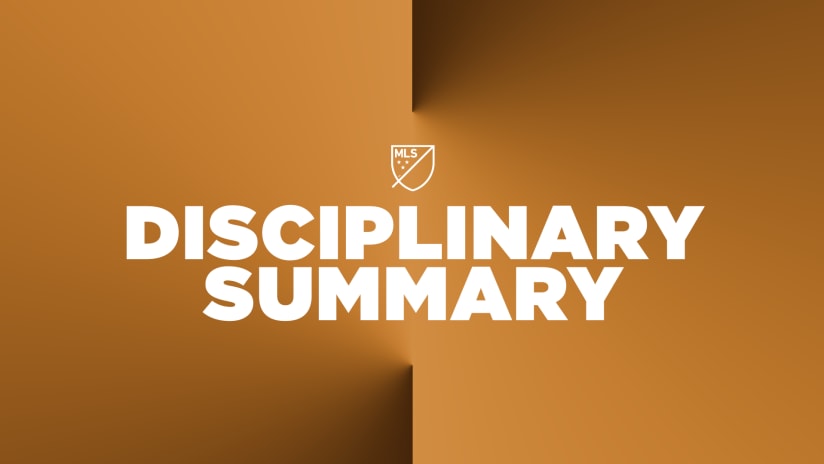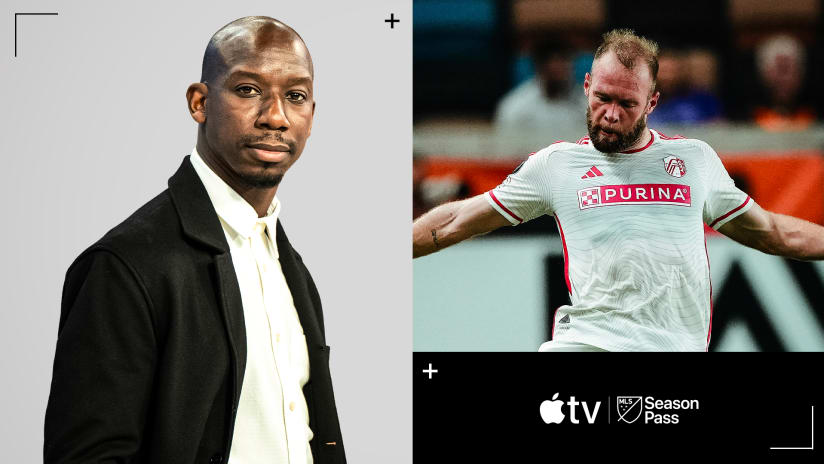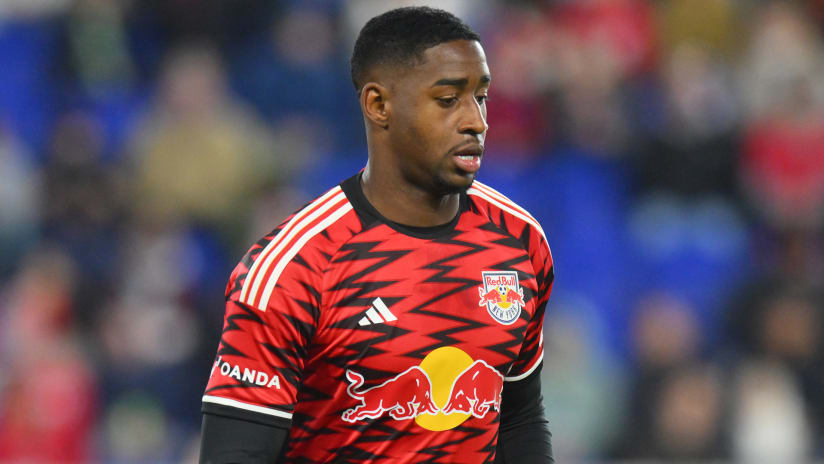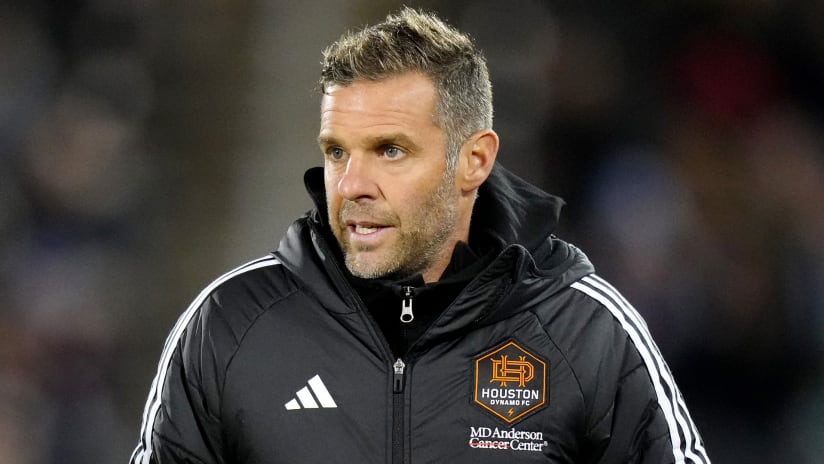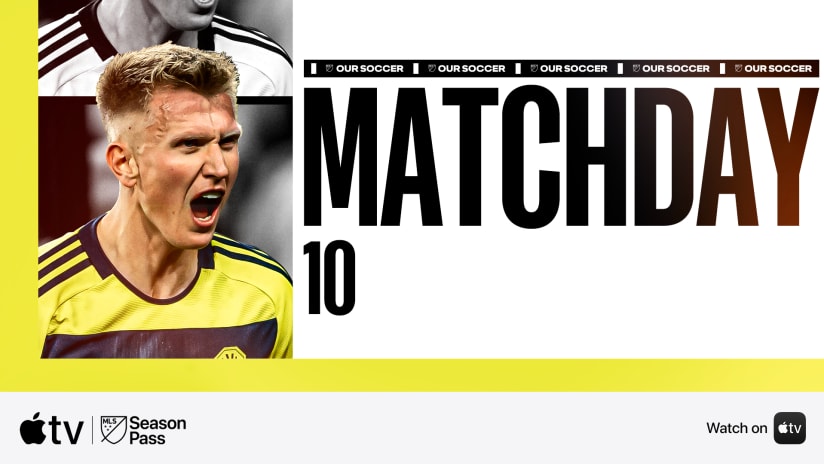A lot of games in Week 20, so a lot of stats, anecdotes and pure plays to sift through. Let's dig in with a takeaway for each side:
Atlanta United
It’s fair and accurate to call Atlanta slow and dull this year … but I want to make sure the frustration doesn’t get taken out on the idea of possession. It’s the lack of planned final-third coordinations, not the possession itself, that’s boring. I get sensitive when people get mad at teams for passing the ball. The fundamental point of possession is to create intentionality. When you control the ball, you control the type of moments that come in the game. You can then make those moments awesome. Because you have more of the ball in more thoughtful ways, you can create a higher number of awesome moments.
We see it from the best teams around the world; they are both methodical about possession and exhilarating. Atlanta United, though, have not been utilizing those moments. They set themselves up, they set the defense up, and then they… go set the same moment up elsewhere on the field? They seem to run out of ideas; they don’t know what to do when they get to those moments. It’s okay to be frustrated by the Five Stripes, just don’t take it out on the possession philosophy, please.
Chicago Fire
Bastian Schweinsteiger played as a left center back, middle center back, and right center back within the same 90 minutes in Saturday’s 2-0 loss at Philadelphia. He had a free role center back position. I’m not sure I’ve ever seen anything like it. Look at that pass map! Francisco Calvo and Johan Kappelhof had to constantly adjust to Schweinsteiger’s positioning. He started as the middle player in the three and then would end up on the right or left. I get the idea of giving Schweinsteiger the freedom to do what he wants; and if this was the plan from day one, then maybe the Fire could figure out its intricacies. But this is getting out of hand. It’s another game when Schweinsteiger and the Fire tried something new and another loss. Maybe it’s time to realize the two might be correlated.
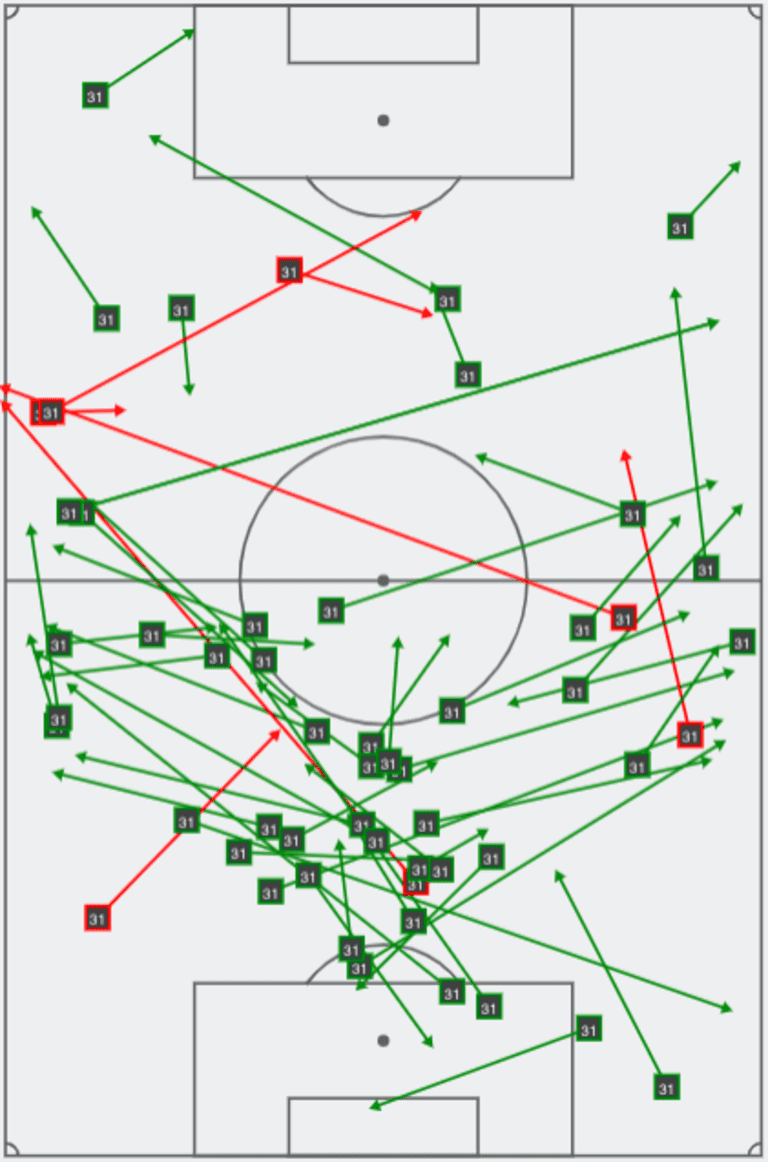
Schweinsteiger's passing map vs. Philadelphia in Week 20.
FC Cincinnati
I’m out of FC Cincinnati thoughts at the moment so I opened it up to the group chat and Matt Doyle submitted the best response:
“We’ve seen other teenagers around the league put in positions where they can win a job, and the same is true for Frankie Amaya. But we’re still waiting for him to do more than just show glimpses of talent. On Sunday he was the No. 10 in a 4-2-3-1 and at no point did he drive the game forward, take the kind of risks a No. 10 needs to, and create chances.
So now the question is 'Ok, does he defend enough – cover enough ground – to be a No. 8?'
He’s closing in on 1,000 pro minutes and… I have no idea. I just know that I want to see more.”
Colorado Rapids
Sebastian Anderson had an eventful day. The 16-year-old scored the opening goal for the Rapids and then got sent off a few minutes later. It was a horrible tackle that absolutely deserved to see red. There’s no condoning that challenge. I’ll walk the fine line, though, and say that I like the mentality that leads to that type of challenge. It shows an intensity and lack of hesitation that most young players take a while to develop.
Young players often play more timid as pros than they did as amateurs, even though the lack of fear is what separated them from their peers. The sooner a player can feel natural on a professional field, the sooner he can start to really grow as a player. Anderson needs to harness that energy better than flying into dangerous tackles, but I hope he doesn’t lose the aggression that preceded it.
Columbus Crew SC
The Crew deserved to win. I’d like to talk about what they did well (David Accam!!!). I can’t stop thinking about Caleb Porter’s halftime comments, though. With the score tied 1-1, he was asked about the team’s performance and he went out of his way to talk about the goal they conceded. “We were supposed to be man-to-man and we were zoning,” Porter said of the corner kick that Montreal scored on. “I don’t know who is calling that.” It’s uncommon for players to make that change on the fly, so I went back to figure out what happened.
Montreal had two set pieces earlier in the half (one corner kick and one set piece from near the corner). On the free kick, shown below, Columbus defended in a zone.
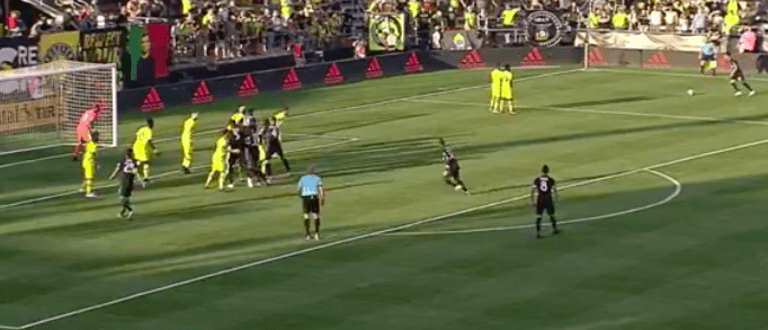
Crew SC's zone defense on a set piece vs. Montreal.
For the corner kick 20 minutes later, Columbus played man-to-man.
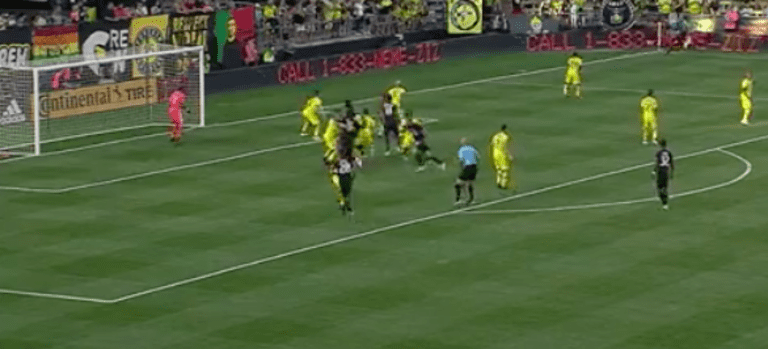
Columbus man-to-man defense on a Montreal set piece.
Usually teams defend free kicks near the corner the same way they would approach a corner kick. But Montreal hit the crossbar when Columbus zoned so, I can understand why players would feel the need to switch in the moment. But for the corner kick at the end of the half, the one that Montreal scored on, why on Earth would you go back to the zone?
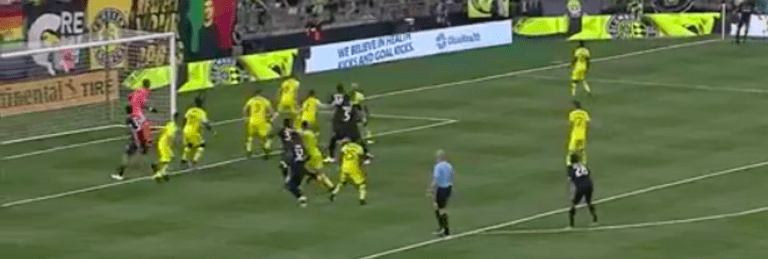
Columbus appear to fall back into a zone, which Montreal scores on.
I really have no idea what was happening. Columbus survived in the end, but it was weird span of events.
FC Dallas
Nobody comes out of the weekend feeling better than FC Dallas. On the road without their best player against a team they are trying to fend off for a playoff spot. They didn’t play great, but they did enough. I’ve been very high on Dallas in a way that perplexes some people — especially those in Seattle and Minnesota — given Dallas’ spot in the standings. Hopefully this video helps explain why.
D.C. United
D.C. did just about everything right...except score their two breakaways. They were smart about how they approached the game -- extremely compact, sans Wayne Rooney -- and committed to the cause. They flipped two turnovers into Paul Arriola/Lucas Rodriguez breakaways; if D.C. score one of those, they might be walking out of the Benz with a win. But they didn’t and still have only two wins in the last 11 games. I wonder if they are now looking down in the standings — only five points to the playoff line — more than up.
Houston Dynamo
Because of course the Dynamo lost at home last weekend and then decided to go up to Canada and lay the smack down this weekend (without Alberth Elis!). Wilmer Cabrera started Tomas Martinez on the right and Tommy McNamara behind Mauro Manotas. McNamara got the scoring started with a really nice fun and finish.
This was the first time that I thought Cabrera used McNamara properly. McNamara is a pure goalscorer; he’s not a passer or facilitator or goal-creator. If you play him and expect him to impact the flow of the game, he will let you down. He needs to be in a position to find the goal. It’s similar to Wondo -- it’s hard to explain what he does well, but he has a knack for putting the ball in the net. Put him in a spot to find the goal, and McNamara will score goals.
LAFC and LA Galaxy
Guillermo Barros Schelotto picked a fantastic gameplan. He made three big decisions:
- Favio Alvarez followed Eduard Atuesta when LAFC were in possession. Atuesta, the best defensive midfielder in MLS this year, didn’t get a chance to get into the game. Specifically, that meant that Mark-Anthony Kaye or Latif Blessing had to drop more often than usual, and they weren’t able to get the ball in front of the Galaxy’s defense.
- Julian Araujo, who has played right back this season, played right winger. His natural defensive instincts and willingness to run provided defensive cover to the midfielders and right back.
- The Galaxy tightened their back four horizontally and made it difficult for LAFC to play the splitting passes toward goal that they’ve used to kill teams.
All of this clogged up the middle pushed the play to LAFC’s outside backs. When you think about LAFC’s team, you want to force the outside backs, Jordan Harvey and Tristan Blackmon in this game, to beat you. LAFC didn’t notice and didn’t take what they were given. They continuously tried to play back into the middle of the field instead of creating overloads and attacking the space near the sidelines.
The Galaxy successfully took away what LAFC were looking to do, which in turn gave them a chance to make it a game of moments. If you haven’t noticed, Zlatan Ibrahimovic wins the moments.
This is the 2019 Galaxy. They aren’t going to out-soccer you, but they will frustrate you and then they will Zlatan you. It’s effective and entertaining, if not frustrating from a soccer perspective.
For LAFC, their task is clear, as shown in the U.S. Open Cup loss to Portland and Friday’s loss to the Galaxy. Teams are going to try to make it ugly against them. Do they “try to find the football,” or do they take the route of 2018 Atlanta and accept they need to suck it up and play ugly as well?
I very much hope it’s the former.
Minnesota United
Are the Loons a full-on counterattacking team now? In the last four games, three wins and a draw, they’ve completed 227 (home), 203 (away), 103 (home), and 212 (away) fewer passes than the opponent. It took me a while to catch onto; this week I was actually going to praise their defensive game plan and shape. Then I realized, though, that this is how they played the last three games, as well. They ceded ground and ceded the ball and hoped to play on the counter.
What I can’t figure out is whether it’s a product of the individual games — San Jose, Dallas, and Real Salt Lake all have the ability to push teams back — or a concerted effort from the Loons. My criticism of Minnesota over the last two years is that the plan seemed to be, “you play your soccer and we’ll play our soccer and best of luck to both teams.” They hadn’t really done anything like this on purpose to gain an edge. Part of me is disappointed that they aren’t trying to play nicer soccer. But most of me accepts that this is probably how the Loons get into MLS Cup. They mimic Portland’s 2018 approach — use Ozzie Alonso and Ike Opara to eat everything in the middle, and use Darwin Quintero on the break. (Also, Doyle gives deserved praise to Hassani Dotson in his Sunday wrap-up.)
Montreal Impact
It would be hard to explain to someone that this Montreal Impact team is the same team from earlier in the year. The team that started the year 6-4-2 did so on the back of strong defensive principles and commitment. Objective A was to frustrate the opponent. They were disciplined and gritty. This team, the one that is 3-7-1 since the first 10 games, is neither disciplined nor gritty.
They seem to have forgotten that they are a defensive team. Maybe the lack of counterattacking pace caught up to them and they felt they needed to adjust — the counterfactual is that they could have remained a defensive team and still lost four straight because they couldn’t play on the break. Either way, they need either a new signing on the wing or a fully-fit Ignacio Piatti ASAP.
New England Revolution
It’s now 10 unbeaten for the Revs, and four wins in the last five games. Bruce Arena added a couple more wrinkles this weekend, going with a lopsided 4-4-2. Cristian Penilla played as a true left winger; Carles Gil as an inverted, central-playmaker from the right. Behind them, Diego Fagundez played as a box-to-box midfielder, making the same type of positional shift that Juan Agudelo has made since Arena arrived. They were, once again, dope to watch.
I’ll add a word of caution, though -- this was the third different formation Arena has used in the last two months. Arena would no doubt tell you that those things don’t matter. (And in the East, there isn’t a super high bar at the moment.) But I’m always a little uneasy these days when teams keep changing shape and starting points. In the playoffs, teams with a clearly defined identity tend to win. Arena doesn’t need someone to tell him how to win playoff games, but it’s still something I’ll keep an eye on.
NYCFC
Lost among the conversations about Dome Torrent and the team’s playing style (or lack thereof) has been how damn talented the squad is. We talk about Atlanta and Toronto as the Eastern Conference teams with the most star power, and their ability to use brute force (as Doyle puts it) to beat teams. I might take NYCFC’s attacking group over both of them, though.
They have a rock-solid foundation (Alex Ring), a genius pulling the strings (Maxi Moralez), goal-scoring threats on both sides (Alexandru Mitrita and Ismael Tajouri-Shradi), and a top-level striker leading the line (Heber)... not to mention the options off the bench. They have so many game-changers, and it’s impossible to plan for all of them.
New York Red Bulls
Aaron Long at left back! The 2018 MLS Defender of the Year played most of the game on the left side. He looked good, showing his pace and balance when isolated with quick attackers. I know some people think that my left back stuff is a joke; it’s 99% not a joke (sometimes I play up the joke…). When you look at the player pool for the US men's national team, Long is the most suited player to start in a big game at left back right now. I’m fully aware that his best spot is probably center back, but Long playing slightly out of position is still the best option at left defender. His performance on Sunday reaffirmed that.
Orlando City
The power, or fear, created by the name on the jersey is a real thing. It’s totally cliche, but it’s true. There’s something empowering about having the name of a perennial winner across your chest; there’s something haunting about being associated with a perennial loser. I couldn’t explain why it happens; it’s just one of those things that creeps into a player’s psyche in big moments. Orlando, as it stands, are in the second category. This felt like the type of game that a perennial winner (Red Bulls) wins and a non-winner doesn’t. Orlando played well and deserved at least a point. They are good enough to be a playoff team, but they need to win a couple of these big games at some point.
Philadelphia Union
Marco Fabian is alive! This was the exact type of goal/moment they’ve needed to show they could score:
But also… they need Jamiro Monteiro back. They miss his energy and athleticism — and reckless abandon — in the midfield.
Portland Timbers
Sunday’s win over Seattle in front of 50,000 fans will be the more memorable result for fans, but it’s probably Thursday’s draw with Orlando that will be on Gio Savarese’s mind this week. Against Orlando, Portland struggled, once again, to control the game while controlling the ball. The Timbers will almost certainly play more games that shape out like Orlando than Seattle throughout the rest of the year. They need to be more intentional about setting up the right moments. Three adjustments that could help:
- Start the wingers wider so they can pick up more speed going into 1v1 situations. The extra three yards will allow Jeremy Ebobisse and Sebastian Blanco to get at full speed when approaching defenders, and then it just takes a drop of the shoulder.
- If the wingers cannot/do not start on the touchline, get the outside backs to overlap sooner. Portland are excellent at quickly changing the point of the attack, but they are often slow to get the extra player involved to capitalize on the overload that comes from it.
- When you play early balls into the box, release Cristhian Paredes to push closer to the edge of the 18 to win the 2nd balls. Crosses are stupid, unless you accept that the 2nd ball creates a better goal-scoring opportunity than the first ball.
Real Salt Lake
RSL are middle-third patterns away from being really good. They do a lot of things well, but they look lost in possession. It’s fluid, which can be fun, but too often it becomes directionless. Watch RSL’s midfield movements compared to LAFC, Dallas, San Jose, and Philadelphia.
The latter four are constantly rotating in relation to each other. RSL don’t have those coordinations. Everton Luiz, in particular, could use some instruction. He’s on the field for his defensive instincts, and he often positions himself for defensive duties even when RSL have the ball (he basically avoids getting the ball). RSL could develop some better ideas of spacing and patterns for the Everton Luiz-Kyle Beckerman relationship that might help them become more productive with their possession.
San Jose Earthquakes
A few weeks ago, I wrote that man-marking didn’t make much logical sense. In doing so, I forgot one of my main beliefs in the game: Coaches should use tactics to help players get in the “flow state.” The more a player doesactively, rather than standing and waiting, the easier it is to get into “the zone,” the mental state every athlete wants to be in. Man-marking helps with that. You always have to be running and thinking. If you take a second off, you get exposed and embarrassed. Your brain is constantly churning. It’s the perfect balance of thinking but not over-thinking. The tactic, for whatever it lacks in shape, helps players achieve the most important part of the game. My goodness does it show. The Quakes play the hardest, fastest, most focused, most intense soccer on a consistent basis.
Seattle Sounders
More and more, with the new single-elimination playoff format, we need to adjust the way we think about the playoffs. The playoffs should be dissected similar to how the NBA thinks about them — in matchups, and who is a good/bad matchup for who. It’s not necessarily “Who are the best teams.” It is, “Who would beat who on a given day?”
Right now, you’d have to take the Timbers over the Sounders. The Sounders are 1-4-1 (I’m counting the two-leg 2018 playoff series that ended in PKs as one draw) overall against Portland since Gio Savarese got to Providence Park. Portland’s counterattacking gameplan has caused Seattle problems. We could split hairs on who deserved to win on Sunday (I feel that Portland flexed their superiority and demonstrated they are better right now), but the six-game record tells a clear story. There’s a long way to go until a playoff game, and Garth Lagerway still has a Designated Player spot in the hole, but right now the Sounders are chasing the Timbers.
Sporting Kansas City
Honneesstttllllyyy… You’ve got to me kidding me. Two wins on the bounce and it looks like you’re back and then you lose a game like that? Two mistakes that hand Dallas goals? Peter Vermes has earned the benefit of the doubt, but he probably made the wrong call with his lineup on Saturday. He opted not to start Benny Feilhaber. Instead, he went with Gianluca Busio and Gedion Zelalem with Felipe Gutierrez in the middle. I love the idea of putting 17-year-old (elite prospect) Busio into a pressure-cooker like that, and Zelalem had started the last two wins; I understand Vermes’ thought process. But it’s a giant six-point game with your season potentially on the line and you don’t go with the guy who has done it a hundred times before? ...especially given they didn’t have Ilie Sanchez either. I wouldn’t mind Busio or Zelalem, but putting the two of them into the fire together was a little too much to ask. I suspect Vermes would find a way to get Feilhaber in there if he had a do-over.
Toronto FC
Forget It Happened.
Except Laurent Ciman’s performance. I’ve been defensive of Ciman — Matt Doyle has been saying he’s been a liability all season — but his performances cannot be defended anymore. There’s no reason for Greg Vanney to trust him at this point. Ciman’s spot on the depth chart — third at center back, as I read it — needs to be surrendered, with Liam Fraser the favorite to take it.
Vancouver Whitecaps FC
Man, it’s been a gloomy end to the Takeaways this week, hasn’t it?
Vancouver tried to start back at the beginning, with a clear and simple defensive game plan. It was a return to Phase 1. It felt like the exact right decision given their situation and the opponent. The ‘Caps had been successful with the implementation of Phase 1 earlier this season, after all. For a reason I can’t quite figure out, though, they seem to have backtracked. They weren’t nearly as intelligent or disciplined about their defensive decisions in Saturday’s 3-1 loss to San Jose.

